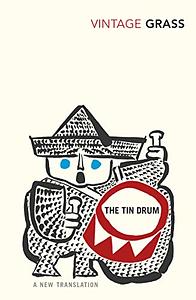You need to sign in or sign up before continuing.
Take a photo of a barcode or cover
adventurous
challenging
dark
emotional
funny
mysterious
reflective
sad
slow-paced
Plot or Character Driven:
Character
Strong character development:
Complicated
Loveable characters:
No
Diverse cast of characters:
Yes
Flaws of characters a main focus:
Yes
After 546 pages I still don’t really know what is going on. Quite the tough read to follow and I’m curious how much more difficult it is based on the translation you have. It’s a shame because I really wanted to like it.
An unrelenting war symphony. Satirical, brutal, genius.
I first read this book either in my late teens or early 20s. Either way, I think I was too young to be able to appreciate a book like this where nothing really happens, certainly nothing in a thrilling manner. However, upon this latest read, I definitely enjoyed the subtle humor throughout this book. It's also a very dark book in many ways, but it's told in such a, "Oh, by the way, this terrible thing happened.", that you don't really pickup on how awful parts of it are unless you're really paying attention to what's being said.
This book is very much in the vein of "absurdism" ie, post-modernism. Our protagonist, Oskar, is an unreliable narrator at best. He tells us that he was born with his full intellectual capacity and can remember everything from birth on. He also says that at age 3, he intentionally quit growing so that he would not have to become an adult. We are told essentially Oskars entire history beginning with his grandmother all the way until Oskar's 30th birthday, which encompasses from ~1900-1950.
For me, one of the most appalling things about this book were several instances of rape, including committed by Oskar. In each of the cases, the women are portrayed as being ok with it, which seems a bit unrealistic. But, all in all, I found this book to be quite funny at times and I think the writing is top-notch.
This book is very much in the vein of "absurdism" ie, post-modernism. Our protagonist, Oskar, is an unreliable narrator at best. He tells us that he was born with his full intellectual capacity and can remember everything from birth on. He also says that at age 3, he intentionally quit growing so that he would not have to become an adult. We are told essentially Oskars entire history beginning with his grandmother all the way until Oskar's 30th birthday, which encompasses from ~1900-1950.
For me, one of the most appalling things about this book were several instances of rape, including committed by Oskar. In each of the cases, the women are portrayed as being ok with it, which seems a bit unrealistic. But, all in all, I found this book to be quite funny at times and I think the writing is top-notch.
Funny I missed rating and reviewing this jewel. This is the lodestar, the mandrake root, the intrepid ooze making friends in the lukewarm pools of primeval poetry. This was the point of departure. A hallowed book I finished in a laundromat. I almost can't remember my reading life before wee Oskar. Eels, fizz, post offices, onions and Dusters have littered my imagination seemingly forever. I wanted to read the new translation and likely will someday. My memories of my own grandmother now smell like butter.
An extraordinary book, but I had to switch to the audio version to ensure I got through it. There are a lot of characters as the story meanders through Oskar’s bizarre, remarkable life, and while I wouldn’t necessarily call it difficult, it was easy to zone out. No way to give it less than a four, though. The eel fishing scene may have been the grossest thing I’ve ever read outside the horror genre.
reread for class. liked more on first reading, but still super engaging, even though knowing i had to read it has sent me into a small reading slump. favorite scenes: eels and the onion cellar
What a strange book. I first started reading it four years ago and eventually got half-way through. I restarted with the new translation three months ago, reading on and off. I would often read a chapter or so and then need to put it down, either because it was disturbing or tiresome.
And yet, I kept coming back, sometimes after ten minutes, often after a day, sometimes more than a week. It was certainly good. I’ll say genius, though expect it to be controversial. I’d have a hard time recommending it, other than to someone interested in writing---it was certainly innovative and interesting as craft, but not compelling as a novel.
As for the content, it was interesting to read this while watching TV and movies that were of the more traditional plot- and emotion-driven sort. I’ve been trained to expect a clean narrative plot unfolding through a lens of human emotion---love, revenge, ambition, etc.---but there was only one chief emotion in The Tin Drum: guilt. Though lust and jealousy were important, the novel was about guilt---both individual and collective---and in particular, collective guilt in the sense of post-war German Kollektivschuld (interestingly, in almost 600 pages I don't recall a significant mention of the holocaust and yet it didn’t seem lacking---it would have been too specific). There were many characters, but apart from the protagonist, their inner lives were never explored. There was little plot, either---the book percolated from one vignette to another, exemplifying a post-modern chaos in which nothing happens for a reason, and our human responses are as arbitrary as their stimuli.
There are a very few books that I will always keep with me. This feels like it will be one of them, but certainly the one I am least likely to reread---I can’t imagine ever doing this, while the thought of revisiting other such books includes remembering the joy of being in a state of reading that particular book. While I didn’t have to force myself to read it, I’m glad it’s over. The Tin Drum wasn’t pleasant, yet it was deeply rich.
And yet, I kept coming back, sometimes after ten minutes, often after a day, sometimes more than a week. It was certainly good. I’ll say genius, though expect it to be controversial. I’d have a hard time recommending it, other than to someone interested in writing---it was certainly innovative and interesting as craft, but not compelling as a novel.
As for the content, it was interesting to read this while watching TV and movies that were of the more traditional plot- and emotion-driven sort. I’ve been trained to expect a clean narrative plot unfolding through a lens of human emotion---love, revenge, ambition, etc.---but there was only one chief emotion in The Tin Drum: guilt. Though lust and jealousy were important, the novel was about guilt---both individual and collective---and in particular, collective guilt in the sense of post-war German Kollektivschuld (interestingly, in almost 600 pages I don't recall a significant mention of the holocaust and yet it didn’t seem lacking---it would have been too specific). There were many characters, but apart from the protagonist, their inner lives were never explored. There was little plot, either---the book percolated from one vignette to another, exemplifying a post-modern chaos in which nothing happens for a reason, and our human responses are as arbitrary as their stimuli.
There are a very few books that I will always keep with me. This feels like it will be one of them, but certainly the one I am least likely to reread---I can’t imagine ever doing this, while the thought of revisiting other such books includes remembering the joy of being in a state of reading that particular book. While I didn’t have to force myself to read it, I’m glad it’s over. The Tin Drum wasn’t pleasant, yet it was deeply rich.



